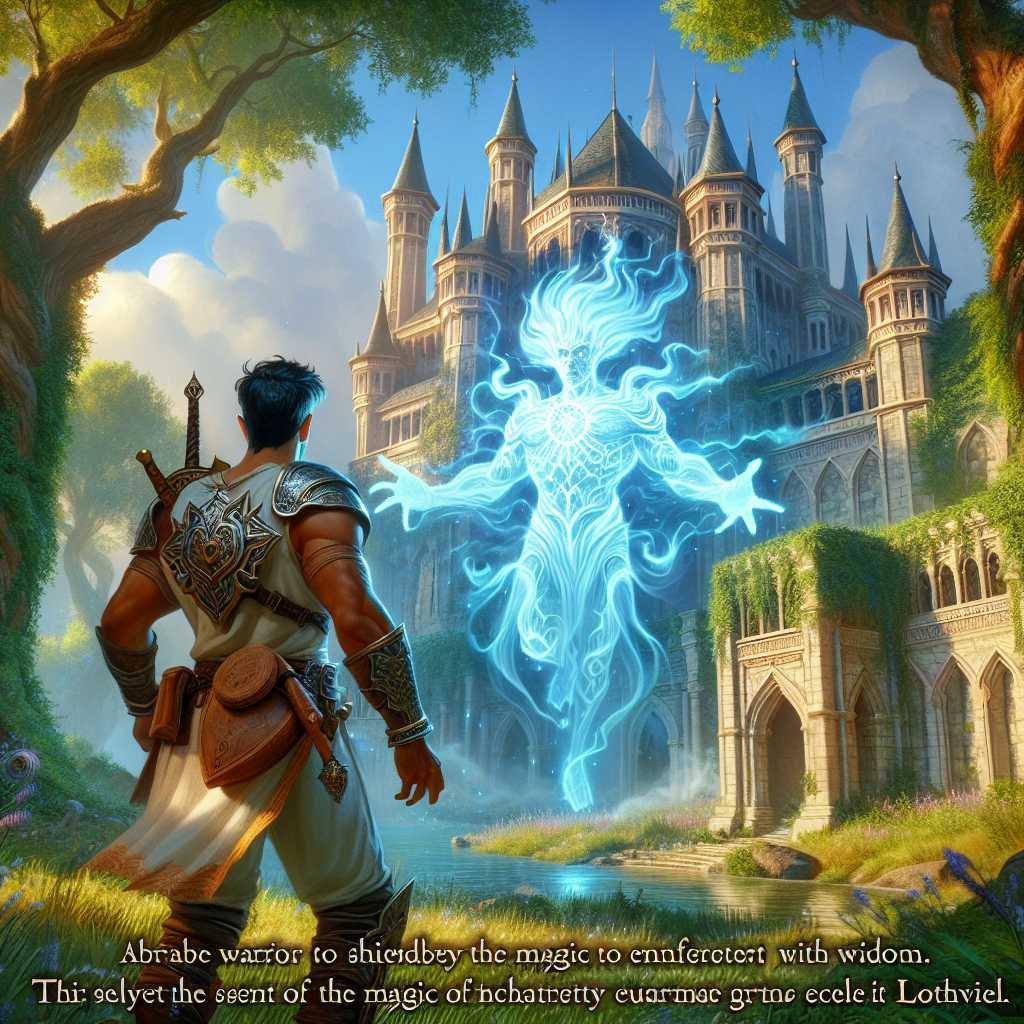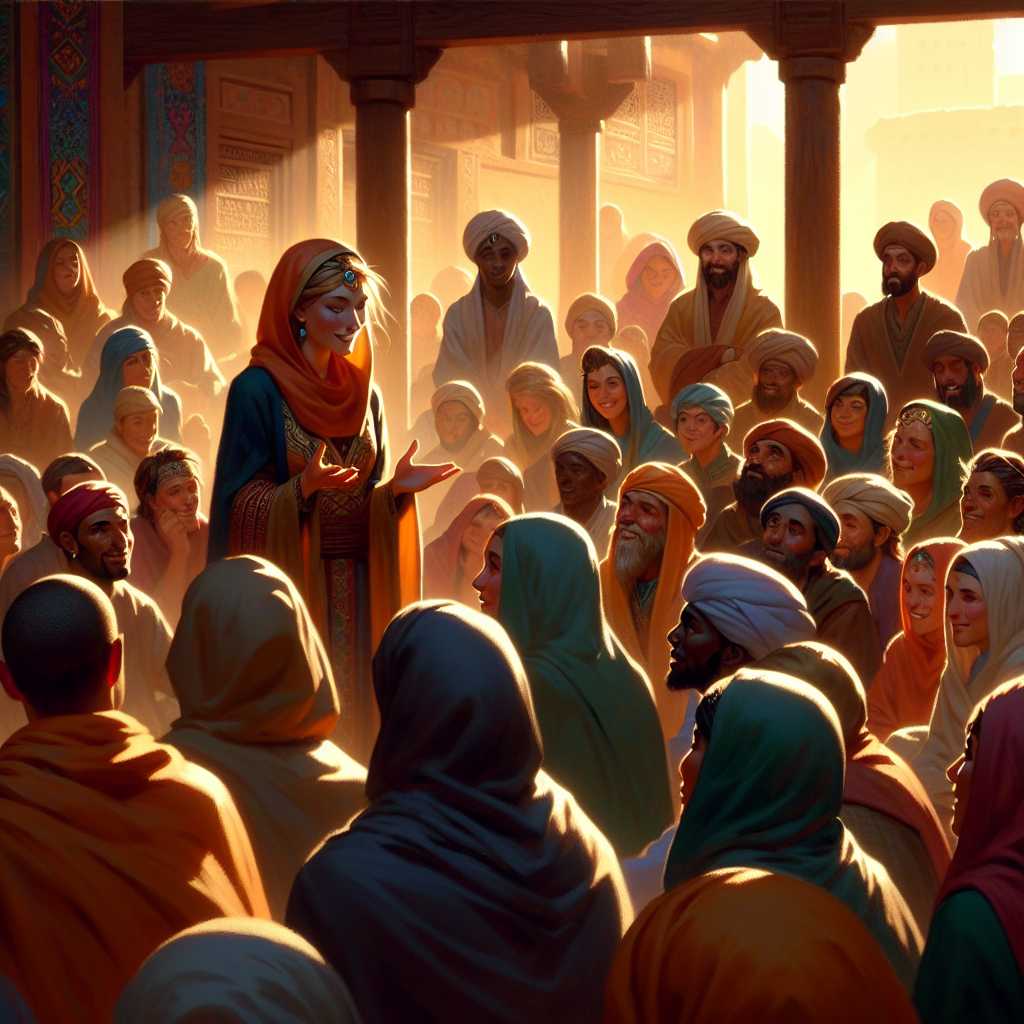
In the heart of the ancient city of Rome, under the shadow of the Colosseum, lived a young and audacious plebeian named Lucius. The boy had a spirit as untamable as the wild horses that roamed the countryside beyond the city walls. As legend has it, on a day when the sun shone with the glory of the gods, a story unfolded that would be whispered through the marbled halls of history for centuries to come.
The air was filled with the scent of olive oil and the clamor of the forum, Lucius thought as he deftly wove through the bustling crowd. His sharp eyes were fixated on a stall boasting vibrant fabrics from the far-off land of India. Without a coin to his name, he could only caress the cloth with longing fingertips, a furtive wish breathed into the rough texture.
With a heavy heart, he turned away, only to find himself face to face with a sight most peculiar—a foreign man of imposing stature, clad in the garb of a Persian emissary. His eyes, dark as night, seemed to pierce the very soul of Lucius. “Young Roman,” he spoke with an accent thick as honey, “I see in you a desire for greatness; follow me, and your fate shall be forever changed.”
So it was that Lucius came to serve the mysterious stranger, whom he learned was named Cyrus. Lucius' days were filled with errands that seemed inconsequential, yet the promise of destiny kept him tethered to Cyrus' side. In the wake of the Persian's dealings, whispers of conspiracy slithered like serpents through the upper echelons of power. Lucius, his eyes wide open yet blind to the totality of his master's design, continued in naivety and servitude.
One fateful morning, as the roosters heralded the break of dawn, Cyrus took Lucius to visit a senator of considerable influence, a man known for his ambition and cunning, Senator Gaius. “Lucius, listen well,” Cyrus commanded, his voice low and commanding, “this meeting will forever alter the course of Rome. Stay sharp and silent as the shadows we glide in.”
The senator's villa was a bastion of wealth and power, adorned with frescoes of mythic battles and landscapes from a land untouched by Roman sandals. Gaius received them in the triclinium, where a mosaic of the goddess Fortuna graced the floor. “Welcome, Cyrus,” he boomed, offering them seats at the marble table. “And who is this with you? An apprentice of sorts?”
Lucius bowed his head in silent acknowledgment, his senses sharpening as the two men began to unravel their discourse. They spoke in hushed tones, the words, “Emperor,” “assassination,” and “throne” emerging from the shadowed conversation like omens of a storm to come.
Days became weeks, and the plot thickened like coagulating blood. Lucius' role grew from bystander to bearer of clandestine messages between Cyrus and a host of shadowy figures. A shroud of secrecy enveloped the young man, the weight of the future pressing down upon him like the armor of a centurion.
It was on an evening painted with the hues of an angry god when Lucius' tale took its most treacherous turn. Under a sky of boiling clouds, he was entrusted with a scroll sealed with the signet of Senator Gaius—its contents a death knell to the Emperor himself. With terror gripping his heart, Lucius pondered the threads of fate which now clung to his fingers.
Seeking solace in the dimly-lit alcoves of the Pantheon, Lucius poured out his heart to the marble statues of the gods. “What role have I to play in this tragedy?” he implored, entwined between fear and duty. In the sanctuary's silence, an epiphany blossomed like a rare flower in the wastelands—a realization of the power he held to alter the path of history.
“I am no pawn in another man's game,” he resolved, the conviction hardening in his soul.
By the light of the morning star, Lucius made his decision. Instead of delivering the treasonous scroll, he approached the praetorian guard, the elite protectors of the Emperor. With bated breath, he unveiled the plot to a tribune, a man with the stern eyes of one who bore the weight of Rome's safety on his shoulders.
“Your information has saved the Republic,” the tribune intoned gravely, clapping a firm hand upon Lucius' shoulder. The ramifications of Lucius' choice were swift. Senator Gaius and Cyrus, the shadowy Persian, were arrested before the week's end, their conspiracy foiled and their names forever tainted with the ignominy of betrayal.
Though Lucius' part in unraveling the conspiracy was never sung in the epics or celebrated in the arenas, those with the eyes to see knew that a mere boy had averted the fall of an empire. He returned to his life, known to most as just another face in the crowd, but to a discerning few, he was the silent guardian of Rome's destiny—a plebeian who had held the tides of fate within his unassuming grasp.
And thus, the story-teller's voice falls silent, the tale of Lucius weaving itself into the tapestry of Rome's vast history, a thread of courage in the dense weave of a civilization's legacy. Let it be known that in the ever-turning wheel of time, the deeds of even the simplest can steer the course of many.










